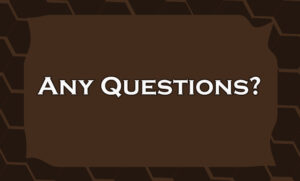After interviewing hundreds of candidates for jobs in several industries and at various levels, I’ve seen just about every job interview mistake possible – and there were some doozies!
Most of them fall into one or more of what I call “10 Ways to Blow Your Interview”. These are the mistakes that are most likely to cause the Hiring Manager to think “Huh?” during the interview and seriously decrease your chances of landing that position.
Here they are, in increasing order of importance.
Number Ten Worst Interview Mistake

Poor posture and/or bad body language.
I can’t tell you how many times I’ve seen candidates walk into an interview, plop down in the seat and fold their arms as if daring me to ask a question.
Almost as bad is slumping in the seat and/or fidgeting (frequently by clicking your pen off and on – guaranteed to drive the interview panel nuts.)
So here it is, short and simple: The three biggest mistakes in this area are folding your arms, fidgeting, and slumping in your seat.
What to Do Instead
You can avoid all three by simply keeping your hands on top of the table (with your fingers interlaced to prevent fidgeting!) and by sitting up straight. Enough said.
Number Nine Worst Interview Mistake
Trash talking about any of your prior employers.
I once asked an applicant I was interviewing for a Business Analyst position to tell me something about his previous employer (a well-known company) that I didn’t know. He promptly blurted out, I’m sure without thinking, “Well, most of the Managers there were Idiots.”
While I guess I could appreciate him sharing his honest opinion, as a Hiring Manager if I hear you saying negative things about your past employers I’ll assume you’ll also bad mouth me and my company at some point of time in the future.
What to Do Instead
Find something positive to say about each of your past employers, even if they were hideous to work for. If you can’t find anything positive to say, at the least keep your remarks neutral.
Number Eight Worst Interview Mistake

Poor choices in the clothes you wear
The most common clothing mistakes include dressing sloppy, dressing too casual for the position, wearing revealing clothing, and loud colors or patterns.
This said, if you have great qualifications, a skill set that is in demand and hard to find, and perform well at your interview, clothing mistakes aren’t necessarily a job killer.
What to Do Instead
This is an area for which you have complete control, so please pay some attention to it and don’t come into your interview with one strike already against you.
My best advice here is to find out what other employees in similar positions at that company are wearing and dress one step up.
The best way to research this, if at all possible, is to visit the company location where you would be working and observe what people are wearing as they arrive and depart.
Another good way is to simply call the HR department, explain that you have an interview and ask what the dress code is for that position. Applicants rarely do this and most HR people are sympathetic and will happily give you advice.
And remember this: I’ll never mark you down for dressing too well!
Number Seven Worst Interview Mistake

Displaying attitude or coming across as arrogant.
You may get away with a certain amount of attitude and/or arrogance if you are superbly qualified with hard-to-find skills. But here’s the thing: attitude or arrogance is almost always an indicator of someone who will eventually turn out to be a problem employee, or to put it more bluntly: a jerk.
I was once on an interview panel for a high-level IT server management position. The person being interviewed was asked how he would handle a problem with a certain type of server hardware. His response was that this was a problem that should be handled by a lower-level position and didn’t we have a question more suited to his level of skill.
This was pretty much the equivalent of having the words “I’m a prima donna” tattooed on his forehead.
What to Do Instead
Answer all questions in an honest and friendly manner, even if you consider them demeaning or downright stupid. You have nothing to gain by displaying a superior attitude.
Always remember this: unless I simply have no other candidates with the right skills, I’ll always avoid these arrogant and bad attitude personality types when making hiring decisions.
Number Six Worst Interview Mistake
Asking the wrong questions too soon (e.g. benefits, salary, vacation time, etc).
Asking these types of questions upfront will make you appear to be more interested in the benefits than the job, which is the opposite of what the Hiring Manager wants to see.
I was once conducting a first interview with a seemingly bright young man for an IT desktop support person. The first thing I asked him was did he have any questions. His response was, “Yes, how much vacation do I get and how soon can I take it?” Turns out he wanted to go to Hawaii that summer with his buddies.
Needless to say, that wouldn’t be an issue. He didn’t get the job.
What to Do Instead
These types of questions should only be asked when you’re actually offered the job and it’s time to actually negotiate. Until then, your job is to convince me you’re the best person for my opening.
We can then talk about things such as salary and benefits. In fact, you’ll be in a stronger negotiating position if I’ve decided you’re the one for the job.
Number Five Worst Interview Mistake
Little or no eye contact and mumbling short answers.
These are usually signs of either nervousness or an introverted personality, which in and of itself isn’t a bad thing. But it can make it difficult for the Hiring Manager to get a good feel for your qualifications and if you are a good fit for the organization.
What to Do Instead
To overcome this, the best advice I can give you is to be thoroughly prepared.
Do advance practice at answering common interview questions. Thoroughly research the company and be able to apply that knowledge in your answers. Have specific examples of your accomplishments and experience that directly relate to the job for which you’re interviewing.
These types of preparation will greatly reduce your nervousness and improve your interview performance. Your ability to give answers in terms of your accomplishments as they specifically relate to the job is the number one thing that will help you avoid mumbling short answers.
As to eye contact, make it a point to go around the room, briefly looking each person in the eye as you answer questions. If you are in a one-on-one interview, simply take turns making eye contact and then looking away.
Number Four Worst Interview Mistake

Talking too much.
I know, this looks like it contradicts the previous Number Five mistake. However, there is a fine line between giving solid, relevant answers to questions and talking too much.
I’ve interviewed many people over the years who talked themselves right out of consideration because they simply would not shut up when answering a question, especially one with which they are particularly comfortable.
They give way too many examples, soar off into unrelated topics and sometimes even end up answering a completely different question.
What to Do Instead
So how do you keep from crossing this line?
Here’s my guideline: target your answers to be two to three minutes long at the most. This is enough time to intelligently answer all but the most complex questions and will give the impression that you are succinct and articulate.
I absolutely love applicants that can give brief but complete answers to my questions. These are the ones I put in my “second interview” stack.
Number Three Worst Interview Mistake

Not preparing thoughtful questions about the job or company
When I ask you – and believe me, I will – if you have any questions you’d like to ask and your answer is no, I’ll assume you didn’t have enough interest in the job to do some basic research.
This is an area that I estimate 90% of the people I’ve interviewed over the years handle poorly. They either have no questions or ask general questions that have nothing to do with the job.
What to Do Instead
You need to have at least five questions prepared in advance that are relevant to either the job or the company.
You should only ask three at the most (to avoid violating the Number Four mistake above) and by having five prepared you can pick the three that are most relevant based on the questions and other information you glean during in the interview.
The vast majority of the applicants I’ve interviewed over the years did not have three relevant, thoughtful questions to ask about the job. Those few that did make up the majority of people I’ve hired. Make sure you’re one of them!
Number Two Worst Interview Mistake
Not researching the company.
This mistake can also be the cause of the Number Three worst mistake, as you can’t prepare related questions about the company if you haven’t researched it.
Whenever someone asks me basic and general questions about my company (I had one applicant actually ask me what my company did), I know right away they didn’t do much research before the interview. This usually becomes even more evident when none of their answers to questions include specific knowledge about my company.
This is an automatic two strikes against you.
What to Do Instead
You need to be able to talk about your skills and accomplishments in terms that specifically relate to the goals and objectives of the company for which you’re interviewing and you can’t do this unless you’ve thoroughly researched that company.
When you do, you’ll automatically be ahead of most of the competition and will be the type of candidate that Hiring Managers would send taxicabs for.
Number One Worst Interview Mistake

And now…drum roll please…the number one worst interview mistake you can make: Your actual experience, skills, or education don’t match what was stated on your resume.
Many job seekers make the mistake of using a scattergun approach. They apply for as many jobs as possible, often fudging on their background and experience. They make the mistake of assuming that finding a job is a numbers game.
Unless you used personal contacts, you most likely got your interview based on the strength of your application, resume, and cover letter. It’s critical not to misrepresent or exaggerate your qualifications in any way, as experienced Hiring Managers will be able to easily pick up on this.
If you’re not able to answer specific questions related to the experience and qualifications claimed in your resume, this will become evident very early in the interview. Now you’ve wasted both your time and the Hiring Manager’s time, as well as stamped yourself as someone untrustworthy.
Not only will the interview very likely end early, but you’ll also be eliminated from consideration anywhere else at that company.
What to Do Instead
Always be straightforward and honest on your application and resume, so that the interviews that you do get will be ones for which you are truly qualified. You’ll interview much better and greatly increase the odds that you’ll get the job.
Visit my extensive Q&A Section
